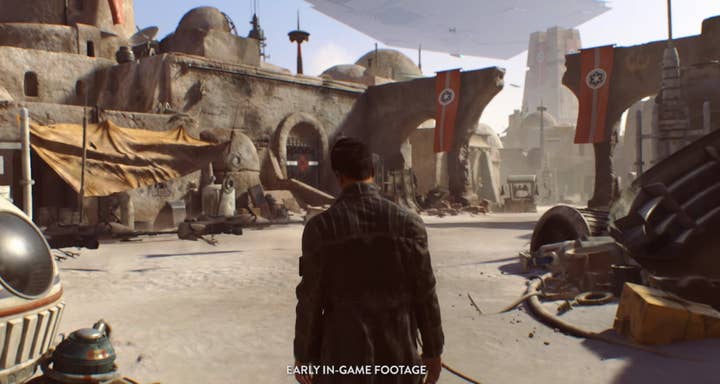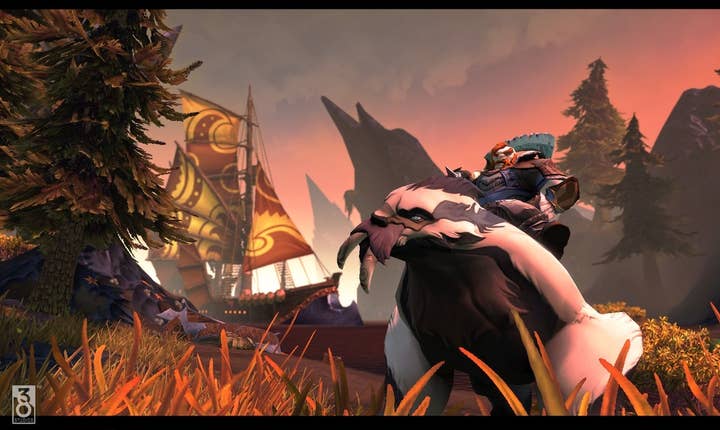IGDA head on the problems with unions
Jen MacLean discusses challenges she sees to organized labor in games, attributes horror stories like 38 Studios to human nature and "wishful thinking"
Four years ago, an International Game Developers Association survey found that 56% of developers were in favor of unionizing the industry. The group has since dropped any question of unions from its annual survey, much to the chagrin of a number of those pro-union developers.
Speaking with GamesIndustry.biz at the Game Developers Conference last week, recently installed IGDA executive director Jen MacLean explained the omission was by no means an attempt to squash pro-union sentiment. Instead, she said it was a practical decision made the academic researchers who conduct the survey. A "core block of questions" is asked every year, while other questions are rotated in once every five years, MacLean said, because there tends to be little movement in the responses year-to-year.
"One of the challenges of unionization is that I believe for it to be effective, it has to be global"
"There was never any kind of nefarious decision to stop asking that specific question, but rather it was part of an effort to make the survey a tolerable length and to rotate in ongoing questions every five years," MacLean said.
Questions about unionization are expected to return in the group's 2019 Developer Satisfaction Survey.
That said, MacLean herself is clearly skeptical about the idea of unions.
"We tend to think of game developers as being very local," she said. "And when you're in the United States, you're not very aware necessarily of the challenges game developers in South Korea face, or that game developers in France, Iran, or Australia face. And one of the challenges of unionization is that I believe for it to be effective, it has to be global. If you were to only unionize for example in France, where there is [the independent union] STJV, you run the risk of having larger companies say, 'OK, does that mean we invest in workforces in other places?'
"The laws around unions around the globe are so complex. The cultural issues around unions around the globe are so complex. That adds a really significant level of difficulty to effective unionization. In the United States, if you were going to try and unionize a game studio, you would need 51 per cent of your employees to agree to unionize before management is obligated to talk to you. I think that is a really high barrier, frankly.
"And there are also some really significant issues from discipline to discipline. It's not a secret that programmers get paid significantly more than artists. And that gets back to supply and demand. There's a much higher supply for artists than there is for programmers. There's a much higher demand for programmers than there is necessarily for artists. That's not to say that one set of contributions is more valuable than the other, but it's basic economics at work. So when we talk about unions, I think it's really important to look at all those issues and how they impact potential unionization. "
MacLean also suggested that unions may not address everything union advocates expect them to, like layoffs and studio closures. She pointed to the EA Visceral closure as one where it's unclear what would have played out differently with unions involved.

"If you are at a smaller studio, layoffs are not necessary because the person running the studio wants a bigger bonus; it's because they don't have the money to make the payroll," MacLean said. "Unions are not going to address that problem; access to capital addresses that problem. EA made the decision to close Visceral for different reasons. Are unions going to impact that? I don't think they are. And that's why I think it's really important to have an open and honest conversation about where we feel the need for unions is, where we feel the unions can be impactful, and also what some of the challenges to effective unionization are."
Game development is a creative field, so chances are projects will always fall apart and studios will always go under regardless of unions (or lack thereof). But what about exploitation and neglect? There's no shortage of bad management horror stories in game development. Would unions have been able to help the workers of Electronic Arts, Take-Two, Activision, Tecmo, Team Bondi, Crytek, Crytek (again), Interzone, Acclaim, TRC Family Entertainment, Cheyenne Mountain, or Vivendi?
"With 38 Studios and Curt, he believed up until the very last moment that he was about to get funding"
How about 38 Studios, the Curt Schilling-founded MMO developer for which MacLean was CEO? She went on maternity leave in March of 2012, and the studio collapsed in May. A number of the studio's nearly 400 employees reported going unpaid for their work in the company's final stretch, with the studio neglecting to keep up medical insurance premiums or pay for moving expenses of new hires who had recently relocated their families to Rhode Island for the job.
"Part of the problem is fundamentally human nature and wishful thinking," MacLean said as to why these instances of neglect and exploitation keep recurring. "When I look back at all of the instances you mentioned, I don't have first-hand experience at Crytek, but I can say for example, with 38 Studios and Curt, he believed up until the very last moment that he was about to get funding.
"You see this with studios that have a really big hit and hire up 100 people to spin up two or three more game programs, then realize, 'Gosh, lightning doesn't strike twice and this is actually really hard, and maybe it wasn't that I was super-brilliant but I got lucky and I have to lay off those teams.' It is wishful thinking. And one of the things I have to ask myself constantly is, 'What is the IGDA's role in helping people balance that inherent optimism and wishful thinking?'

"Because when you go into being a game developer, there's a lot of feeling like you can beat the odds. If you were to look on paper at becoming a game developer versus any of the other careers you could choose, it doesn't look like a smart decision on paper. But we do it because we love it. We do it because we believe that we can create something amazing. We do it because we want to create art. We do it because there is some wishful thinking there."
For MacLean, the best thing the IGDA can do on this front is to help people mitigate the consequences of wishful thinking and understand the opportunities they have in front of them. That educational push is in keeping with the group's new mission statement (unveiled during GDC): "IGDA supports and empowers game developers around the world in achieving fulfilling and sustainable careers." Beyond that, the IGDA has always touted itself as an organization devoted to networking and advocacy for its members as well.
"To me, advocacy has to be about what is in the best interests of game developers around the world," MacLean said. "And I believe the IGDA's role is to give game developers information to make good and smart decisions for themselves."
"We want to make sure you understand that you have a very long career, and what is right for you at 25 may not be right for you at 35, may not be right for you at 45, may not be right for you at 55"
For example, she says on the topic of crunch, that means educating developers and employers alike about the costs of crunch. She said the practice of crunch is "nowhere near as prevalent" in the industry as it was a decade ago, and believes the IGDA has led the larger conversation about the subject.
"There are absolutely still companies who crunch, who are very honest and transparent about it, who will continue to do it because it has helped them deliver blockbuster franchises and they believe that is the best way to make games," MacLean said. "But we are also educating game developers about the consequences of going to work for that company.
"And I think one of the things that's important for the IGDA is to say, 'Look, if you're considering this choice, here are the consequences.' But if you make this choice because, for example, you want the financial rewards that go along with this, we're not going to judge you. You're still a member and we still want to support you. And we want to make sure you understand that you have a very long career, and what is right for you at 25 may not be right for you at 35, may not be right for you at 45, may not be right for you at 55. We want to support you along every step of that journey."
MacLean acknowledged that not all of the group's efforts to lead conversations have been as successful. In 2008, Warhammer Online developer Mythic Entertainment made headlines when it refused to credit any developers who worked on the MMO that had parted ways with the studio before it shipped. (The game was announced in May of 2005 and released in September of 2008.) MacLean, then the chairperson of the IGDA, publicly excoriated Mythic for the move, calling it disrespectful and misleading. She also called for the adoption of industry-wide standards for crediting developers' work on games, with those standards to come from an IGDA Credits Standards Committee formed the year before.
Ultimately, the effort fell apart and the IGDA never proposed credits standards, much less had them adopted throughout the industry. MacLean pointed to an inability to keep volunteers engaged with the effort after the headlines fell out of the news cycle.
"One of the challenges with a volunteer organization is you have to maintain interest over the long term," MacLean said. "You have to take the sharp and intense burst of interest when something hits the news and figure out how you maintain that to drive meaningful and lasting change. So when I look at my role with the IGDA and my long-term goals, it is really figuring out how we can harness our volunteers, match them with the resources the organization has, and use that to drive meaningful long-term change.
"And that's hard with a volunteer organization, especially when you have interest that wanes, and when people are getting ready to ship a game, or they have a kid, or their partner gets sick or they get sick, and all of the 100 things that come up and end up distracting them."
She said the credits standards may still come, as it's part of a "long-term strategy" the group has to better engage volunteers at the local chapter and Special Interest Group level.
"I haven't met many people who don't think game developers should be fairly credited for their work," MacLean said. "And I think that's something where there is a lot of common ground, and we just need the volunteer workforce and the IGDA leadership to make sure it happens."
The challenge with making sure that happens is it puts the IGDA in an entirely different kind of competition than developers are used to.
"Maybe you choose to volunteer at an animal shelter, or you run a marathon, or you work to raise money for a cause you believe in," MacLean said. "To me, the question I [have to] answer is, 'How do I make the IGDA, and working as a chapter leader, or a SIG leader, or a special project volunteer, or a volunteer at GDC, something that is impactful and meaningful, something that makes a person with a limited amount of time say this is how I want to spend it?'"








